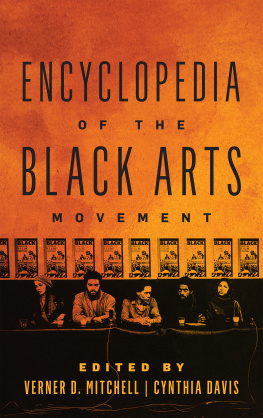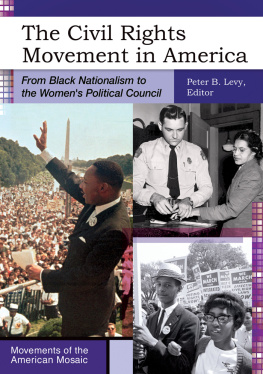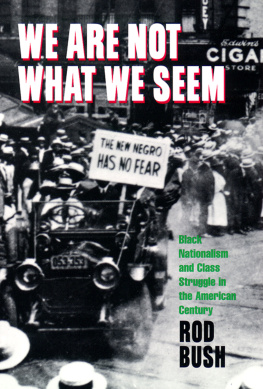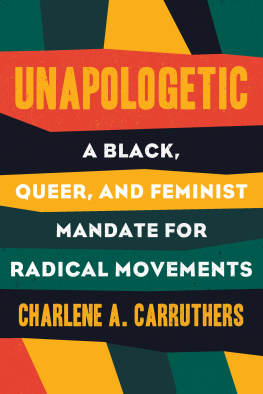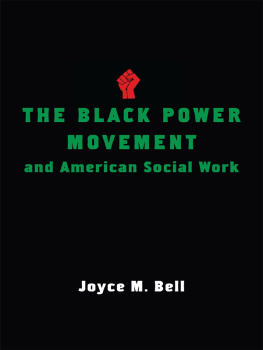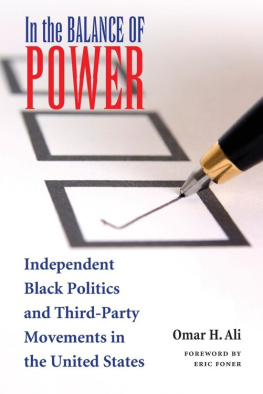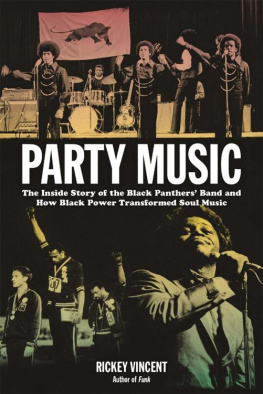This book was published with the assistance of the Z. Smith Reynolds Fund of the University of North Carolina Press.
2021 The University of North Carolina Press
All rights reserved
Set in Merope Basic by Westchester Publishing Services
Manufactured in the United States of America
The University of North Carolina Press has been a member of the Green Press Initiative since 2003.
Library of Congress Cataloging-in-Publication Data
Names: Smethurst, James Edward, author.
Title: Behold the land : the Black Arts movement in the South / James Smethurst.
Other titles: John Hope Franklin series in African American history and culture.
Description: Chapel Hill : The University of North Carolina Press, 2021. | Series: The John Hope Franklin series in African American history and culture | Includes bibliographical references and index.
Identifiers: LCCN 2020044269 | ISBN 9781469663036 (cloth ; alk. paper) | ISBN 9781469663043 (pbk. ; alk. paper) | ISBN 9781469663050 (ebook)
Subjects: LCSH: Black Arts movementSouthern States. | American literatureAfrican American authorsHistory and criticism. | African Americans in literature. | Black nationalism in literature. | Black nationalismSouthern StatesHistory20th century. | African AmericansSouthern StatesIntellectual life20th century.
Classification: LCC PS153.N5 S558 2021 | DDC 810.9/896073dc23
LC record available at https://lccn.loc.gov/2020044269
Cover illustration: Were You There by Jim Alexander (African Liberation Day, Washington, D.C., 1972). Used by permission of the artist.
Portions of this book were published in different form in The Black Arts Movement in Atlanta in Neighborhood Rebels: Local Movements for Black Power in America, edited by Peniel Joseph (New York: Palgrave Macmillan, 2010); Retraining the Heartworks: Women in Atlantas Black Arts Movement in Women in the Black Revolt, edited by Dayo Gore, Jean Theoharis, and Komozi Woodard (New York: New York University Press, 2009); Black Arts South: Rethinking New Orleans and the Black Arts Movement in the Wake of Katrina in Radicalism in the South Since Reconstruction, eds. Christopher Green, Rachel Rubin, and James Smethurst (New York: Palgrave Macmillan, 2006); and The Black Arts Movement and Historically Black Colleges and Universities in New Thoughts on the Black Arts Movement, eds. Lisa Gail Collins and Margo Crawford (New Brunswick: Rutgers University Press, 2006).
Acknowledgments
This project was a long time coming. As always, it is the result of the work of many hands, not the least the people who built the Black Arts movement in the South. Nevertheless, its flaws are strictly my own. I am grateful to the many people who contributed. As always, please forgive me if I have forgotten someone.
First, I would like to thank everyone who allowed me to interview them (in some cases more than once): Jim Alexander, Abdul Alkalimat, the late Amiri Baraka, John Bracey Jr., Pearl Cleage, the late Sam Cornish, the late Ebon Dooley, Levi Frazier, Esther Jackson, the late James Jackson, Michael Lomax, Alice Lovelace, the late John ONeal, Kalamu ya Salaam, A. B. Spellman, Edward Spriggs, William Strickland, Ekwueme Michael Thelwell, the late Lorenzo Thomas, Askia Tour, Jerry Ward, the late Nayo Watkins, and the late Ahmos Zu-Bolton. Safe home to those interviewees who have passed since I interviewed them.
I am deeply indebted to the many people who answered questions, gave me leads, shared their research, helped me better understand Black art and Black Arts (and Black Power) in the South, read portions of this study, corrected me, and otherwise supported and encouraged me in ways large and small, including Nadia Alahmed, Quo Vadis Gex Breaux, Emahunn Campbell, Margo Crawford, Maria Damon, Doris Derby, Jonathan Fenderson, Elizabeth Rodriguez Fielder, Tanisha Ford, Henry Louis Gates Jr., Dayo Gore, Kiara Hill, Gerald Horne, Peniel Joseph, Kenny Leon, Kim McMillon, Catherine Michna, Kelli Morgan, Aldon Nielsen, Roscoe Orman, Howard Ramsby II, Eugene Redmond, Mona Lisa Saloy, Sonia Sanchez, Michael Simanga, Cherisse Burden-Stelly, Candy Tate, Jean Theoharis, Stephen Ward, and Komozi Woodard.
I am particularly grateful to the Schomburg Center for Research in Black Culture and its Scholars-in-Residence Program for its support of this project. Many thanks to Farah Jasmine Griffin, the director of the program during my time there. Thanks, too, to my fellow Fellows, Myra Armstead, Devyn Benson, John Perpener, Rashad Shabazz, and Rafia Zafar, for their community and invaluable comments on my work, and to my research assistant at the Schomburg, Melay Araya. And much gratitude to Aisha Al-Adawiya for her generosity and making things happen while I was at the Schomburg.
As always, I want to acknowledge my past and present colleagues in the W. E. B. Du Bois Department of Afro-American Studies at the University of Massachusetts Amherst: Ernest Allen Jr., John Bracey Jr., Yemisi Jimoh, Amy Jordan, Anne Kerth, Agustin Lao-Montes, Toussaint Losier, Traci Parker, the late Femi Richards, Britt Rusert, Archie Shepp, Stephanie Shonekan, Manisha Sinha, Nelson Stevens, William Strickland, Esther Terry, Ekueme Michael Thelwell, Steven Tracy, and Robert Paul Wolff. As always, I am grateful to Tricia Loveland, the organizational heart of the Du Bois Department, for practically everything.
I want to acknowledge the help I received from the staffs of the W. E. B. Du Bois Library at the University of Massachusetts, the Amistad Research Center at Tulane University, the Auburn Avenue Library, the Woodruff Library at Emory University, the Mississippi State Archives, the Moorland-Spingarn Research Center at Howard University, the Beinecke Library at Yale University, the Schomburg Center for Research in Black Culture of the New York Public Library, the Spellman College Archives, and the Woodruff Library at Atlanta University Center.
I want to thank also the editorial and production staff at the University of North Carolina Press, especially Chuck Grench, Debbie Gershenowitz, Catherine Hodorowicz, and Dylan White. I am also grateful for the extremely helpful comments of the Presss two anonymous readers.
I owe many thanks to my family: William Smethurst, Ludlow Smethurst, Richard Smethurst, the late Mae Smethurst, Andrew Smethurst, Alejandra Ramirez, Katie Smethurst, Jacob Smethurst Rubin, Silvie Schlein, Thea Schlein, Rachel Lee Rubin, Jessie Rubin, Merle Forney, and Margaret Forney. Special thanks to Carol Forney.


